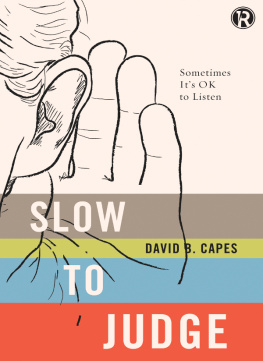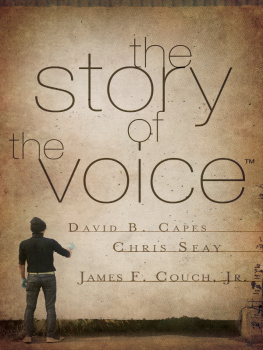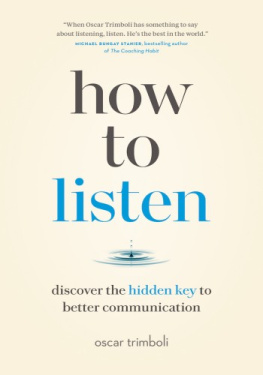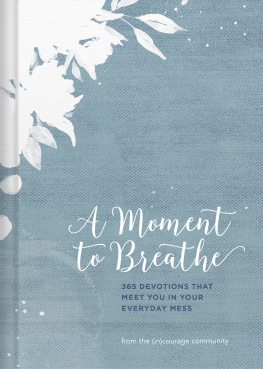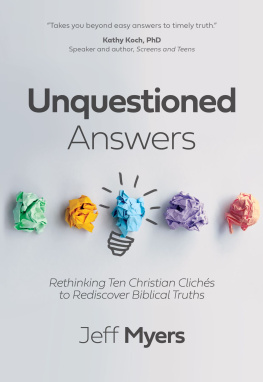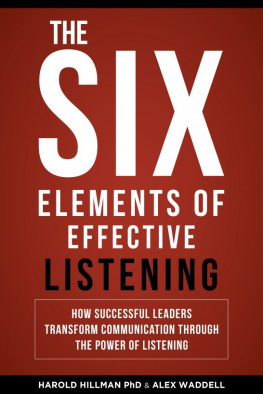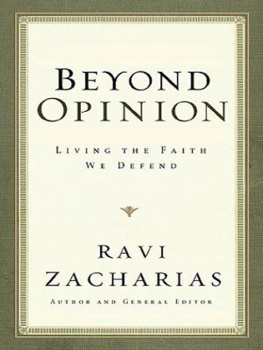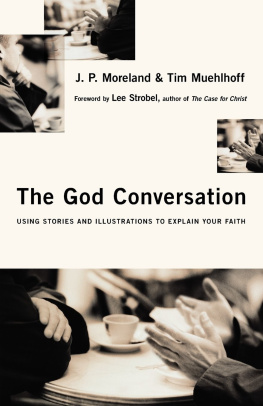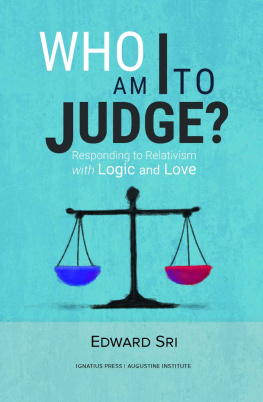ENDORSEMENTS
We live in a post-Christian culture. Militant atheism is growing on the Internet. Immoral lifestyles are being normalized, and those who fail to conform are labeled as judgmental, intolerant, unloving, and (fill in the blank)ophobe. Some have even lost their jobs merely for expressing an opinion contrary to the new moral current. What is the proper response of the Christ-follower who desires to communicate the redemptive message of Gods kingdom effectively yet without compromise? If you are looking for an answer to this question, you have picked up the right book. David Capes is respected all over the world for his fair and careful scholarship in the field of New Testament studies. But this volume is not an academic work. Capes leaves the classroom and invites you into his home where he shares wisdom gained from years of practical experience interacting collegially and on a regular basis with those of different faiths and world views. The pages of this book are filled with spiritual nuggets presented on a platter of winsomeness that readers will find both satisfying and effective. This book will guide you to become the effective witness for Christ you desire!
Michael R. Licona, associate professor in theology, Houston Baptist University
Everyone wants to be popular, yet in the 21st century, popularity and church often cant fit in the same sentence. Why? David Capes roots out the problem and poses a wise solution. In Slow to Judge, Christians are challenged to be careful and thoughtful before taking positions and responding to the moral culture of the day. This lets the church respond firmly but in love and with compassion. It is the course the church should take, regardless of popularity. Yet if we do it right and well, we might just see popularity of the faith change in the eyes of the world.
Mark Lanier, Lawyer, commentator, teacher, author of Christianity on Trial: A Lawyer Examines the Christian Faith
Working within his own deeply rooted Christian faith, Dr. Capes writes convincingly of how the wisdom of a listening heart can enable all human beings to meet each other with respect and love, while prizing their own and others integrity, authenticity and difference.
Muhammed etin, sociologist, congressman-Parliament of Turkey
How in the world, believing that Jesus of Nazareth is the full, perfect revelation of God, we Christians ever lapsed into judgmental, moralistic scolds, Ill never know. Its an offense against God, who meets us in Christ, for us to be known by many mainly for our judgmentalism. See? Im already being judgmental against those who are judgmental! David Capes, in this lively, fresh, biblical, and insightful book helps us to take a good look at ourselves and to look at how we look at others, making us just a bit slower to judge and a great deal more eager to listen, to learn, and to welcome in the name of Christ.
William H. Willimon, professor of the Practice of Christian Ministry at Duke University Divinity School, retired bishop of the North Alabama Conference of The United Methodist Church, and former dean of the Chapel at Duke University.
This book is needed. Winsome without being wimpy, Capes is a leader in interfaith dialog and a role model for me and for many others engaged in discussing our deeply held religious convictions. If Socrates were in Houston, I think he would be on Capes radio program and enjoy this discussion.
John Mark N. Reynolds PhD, provost of Houston Baptist University
Interfaith dialogue is usually no more than two monologues. Davids very clear style, his stories and explanations, reminds me that true dialogue must begin with listening and understanding others through their own eyes, rather than through my own judgments. This is a great book that teaches and elevates the reader to a new understanding of what God expects of us!
Stuart A. Federow, rabbi, Congregation Shaar Hashalom, Houston, TX and cohost of A Show Of Faith radio show
2015 by David B. Capes
All rights reserved. No portion of this book may be reproduced, stored in a retrievalsystem, or transmitted in any form or by any meanselectronic, mechanical, photocopy,recording, scanning, or otherexcept for brief quotations in critical reviews orarticles, without the prior written permission of the publisher.
Published in Nashville, Tennessee, by Thomas Nelson. Thomas Nelson is a registeredtrademark of HarperCollins Christian Publishing, Inc.
Page Design and layout: Crosslin Creative
Thomas Nelson, Inc., titles may be purchased in bulk for educational, business, fund-raising,or sales promotional use. For information, please e-mail SpecialMarkets@ThomasNelson.com.
Unless otherwise noted, Scripture quotations are taken from The Voice Translation. 2012 Ecclesia Bible Society. Used by permission. All rights reserved.*
* Note: Italics in quotations from The Voice are used to indicate words not directlytied to the dynamic translation of the original language but that bring out thenuance of the original, assist in completing ideas, and... provide readers withinformation that would have been obvious to the original audience (The Voice, preface).Author emphasis in quotations from The Voice is indicated with the use of boldfacetype.
Scripture quotations marked NKJV are from THE NEW KING JAMES VERSION 1982 by Thomas Nelson. Used by permission. All rights reserved.
Scripture quotations marked ESV are from the ENGLISH STANDARD VERSION. 2001 byCrossway Bibles, a division of Good News Publishers.
Scripture quotations marked NRSV are from the NEW REVISED STANDARD VERSION of theBible. 1989 by the Division of Christian Education of the National Council of theChurches of Christ in the U.S.A. All rights reserved.
Scripture quotations marked NIV are from the HOLY BIBLE: NEW INTERNATIONAL VERSION. 1973, 1978, 1984, 2011 by Biblica, Inc. Used by permission of Zondervan. Allrights reserved worldwide. The NIV and New International Version are trademarksregistered in the United States Patent and Trademark Office by Biblica, Inc.
Scripture quotations marked KJV are from the King James Version (public domain).
ISBN: 978-1-4016-8019-0
ISBN: 978-1-4016-8020-6 (eBook)
Library of Congress Cataloging-in-Publication Data
Capes, David B.
Slow to judge: sometimes its ok to listen / by David B. Capes.
pages cm
ISBN 978-1-4016-8019-0 (pbk.)ISBN 1-4016-8019-4 (pbk.) 1. ListeningReligious aspectsChristianity. 2. PrejudicesReligious aspectsChristianity. 3. Religious tolerance. 4. Attitude(Psychology)Religious aspectsChristianity. I. Title.
BV4647.L56C37 2015
241.672dc23
2015005083
15 16 17 18 19 20 [ RRD ] 6 5 4 3 2 1
For Rabbi Stuart Federow, Father Troy Gately,
Father Frank Rossi, Father Michael Barrett,
Bishop Oscar Cantu, Bishop Michael Olson,
Father Brendan Cahill, and Father Mario Arroyo.
Together you have taught me how to be
slow to judge and quick to listen.
TABLE OF CONTENTS
In February 1991, I attended a Clergy Institute meeting at Congregation Beth Israel in Houston. I dont recall the topic of the day, but I do recall meeting a man who has become a dear friend. While standing in line with a colleague of mine, I struck up a conversation with Rabbi Stuart Federow. At the time, Federow was the Houston Hillel Director (Jewish student ministry coordinator at Rice University, University of Houston, and other Houston colleges). Since I was a new professor at Houston Baptist University, we had a good deal to talk about over lunch. The conversation continued after the Clergy Institute was over. On the way to my car, Rabbi Federow stopped me and asked a question: David, would you like to be on a weekly radio talk show where a minister, priest, and rabbi compare religious perspectives on issues? I thought the question was a little strange. It sounded like the beginning of a jokea priest, a minister, and a rabbi walked into a radio station.... We had just met, but I said, Sure, sounds like fun!expecting that nothing more would come of it.
Next page
